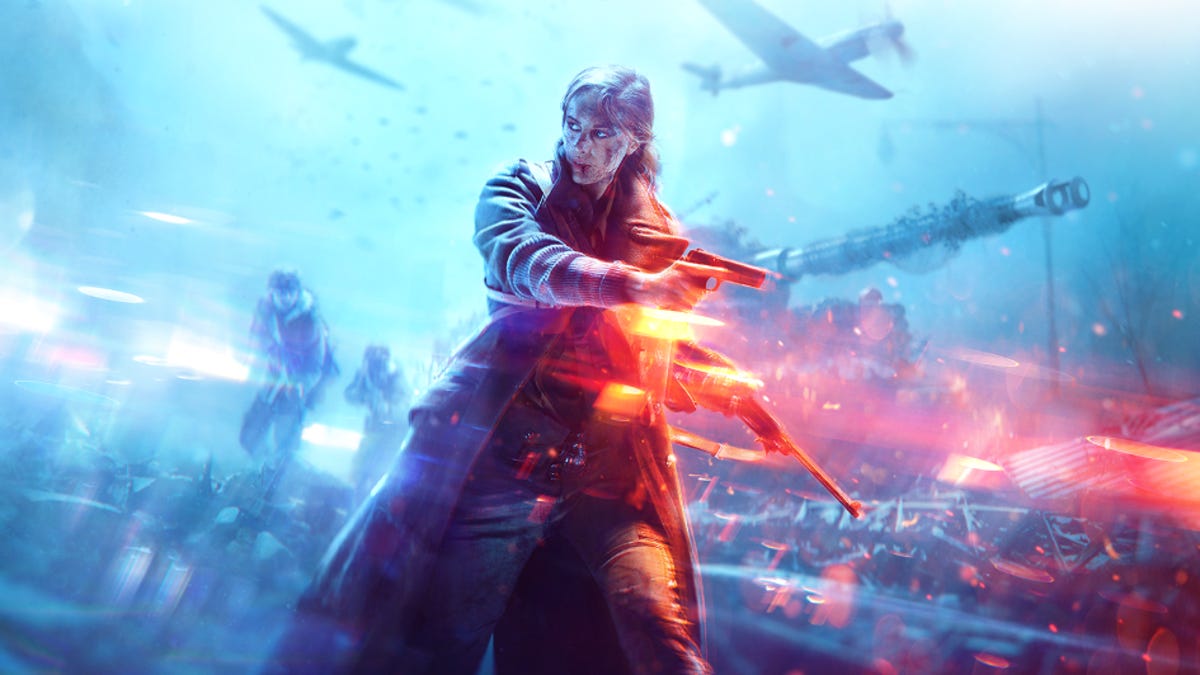President Trump's comments obscure the real problem with video game culture
Commentary: Trump's views on video games are a decade out of step and distract us from real issues the video game culture faces.

First-person shooter video game Battlefield.
Over the weekend, two deadly mass shootings in Texas and Ohio claimed the lives of more than 30 people, reigniting debates about gun control and the uncurtailed rise of white supremacy. To date in 2019, there have been 255 mass shootings in the US.
This time, however, it feels different.
The shooting in El Paso, Texas, in particular, appears to be racially motivated, occurring just weeks after US President Donald Trump suggested that elected Democratic Reps. Alexandria Ocasio-Cortez and Ilhan Omar should "go back" and "fix the totally broken and crime infested places from which they came." These shootings reflect years of divisive political discourse and a disturbing growth of online racist rhetoric that is increasingly resulting in terrifying and tragic real-world consequences.
It's in this context that Trump and House Minority Leader Kevin McCarthy decided to blame video games .
Trump proposes working with social media companies to "detect mass shooters before they strike," and demands regulation of violent video games. pic.twitter.com/888s3deoqr
— Aaron Rupar (@atrupar) August 5, 2019
On Aug. 5, Trump called for regulation of "gruesome and grisly" video games that he argued contributed to the "glorification of violence in our society." McCarthy said that "video games that dehumanize individuals" were partly to blame for America's very real problem with mass shootings.
The White House didn't respond to a request for comment.
Let's state the obvious from the outset: Video games aren't the reason two mass shooters tragically took the lives of 30 plus individuals last weekend. Research indicates that video games don't cause violent crimes and almost certainly have no connection to mass shootings.
It's almost a waste of oxygen to give credence to these claims (or defend them) and, in 2019 it feels bizarre that anyone, let alone the president of the United States, would make those arguments. It feels like an anachronism. A toothless relic from a bygone age. Remember when we used to think smoking had health benefits? Glad we're past all that.
Wait. We're not past that?
Really?
I've been writing about video games for over 15 years. For at least five of those years, it felt like video games were something I had to defend. Video games were under attack from politicians, opportunistic lawyers or lobby groups with an agenda. Back then we defended video games as a group collective, with a rigorous self-righteous rage. Defense felt like the correct posture.
But in 2019 defending video games feels strange -- an act out of time. We sit comfortably at the end of this particular history. Comments like Trump's used to make me angry. Now I find them bewildering, beyond parody. A message from an alternate dimension where facts don't match reality.
I'm a 38-year-old man. Most research concludes the average age of a "gamer" is 34. We're parents, often grandparents. Playing video games is just another thing we doand singling them out seems baffling.
Worst of all it puts gamers instinctively back into that position of defense. A position that damages everyone's ability to be healthily critical of a hobby that often deserves criticism.
Right now the hashtag #videogamesarenottoblame is trending. Over 100,000 plus tweets defending the sacred cow. Once again it feels like we're travelling back to a different age. Gamers, backs pinned against the wall feeling like the victim of a smear campaign. Fighting back, preaching the gospel, conveniently ignoring the fact that if video games have the power to positively change behaviours, they also have the power to negatively impact behaviours.
But in times of absolute defense, it's difficult to honestly reflect on that.
We live in a post-Gamergate age. We live in an age of angry gamers. Video games have a long-standing, extremely complicated commercial relationship with gun manufacturers. 8chan, the place where the El Paso shooter posted a hate-filled manifesto, has long been a hub for organised harassment campaigns of female video game figures. Many believe Gamergate provided a playbook alt-right activists are following to this day.
The longer we are forced to defend our hobby from accusations that make no sense, the more difficult it becomes for gamers to address the real issues.
Because problems with video games (and those who play them) exist. But if we're forced into a position where defense is the only option, it's near impossible to make the kind of transformative decisions that could bring about effective, long-lasting change.

